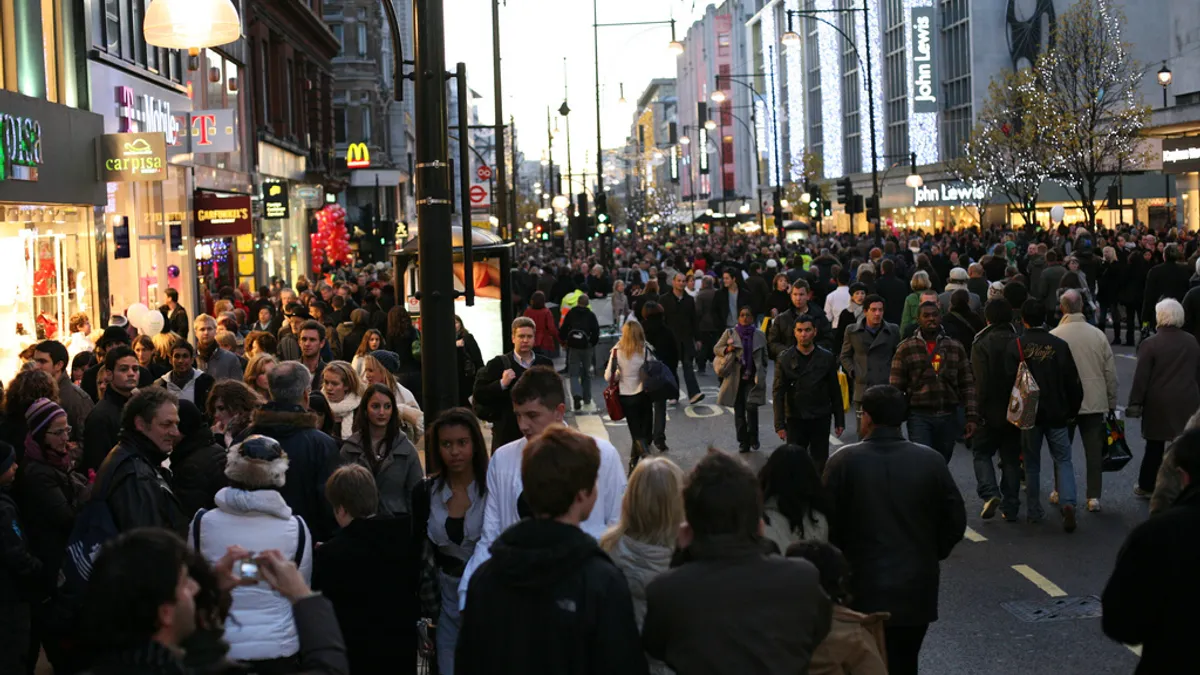When the sun came up on Cyber Monday this week, retailers were already on edge.
Reports were in that Black Friday saw lackluster sales, with the National Retail Federation reporting an 11% decrease over last year's sales on Sunday. Heavy discounting over the Thanksgiving weekend — and before — not only affected sales, but may also have set up consumer expectations for even more discounts into the holiday season.
These apprehensions may have stolen some of Cyber Monday’s thunder. The Salesforce Marketing Cloud found that at least a thousand Cyber Monday conversations on social media were not even focused on that day’s sales events. Rather, they discussed Black Friday’s disappointing sales and what that meant for retailers and their marketing or promotions going forward.
But it may not have been as bleak as the numbers might suggest at first glance. For one thing, online sales were fairly brisk, and mobile emerged for the first time as a big play for retailers.
Here is a look at biggest hits and misses of Black Friday and Cyber Monday.
1. Miss: Black Friday sales
Though some worried that the Black Friday letdown was a sign of continued spending sluggishness, many observers thought that the long weekend was not a distinct sign of the overall holiday retail picture. Rather, these lackluster sales show that “Black Friday” as an event is simply no longer one major shopping day, but many. Many question the accuracy of NRF's 11% decrease in sales number, in fact.
“This year is likely to be the first time in nearly a decade that Black Friday won't be the biggest shopping day of the holiday season in terms of traffic and sales,” says Brand Keys founder and president Robert Passikoff.
“This is due in part to the fact that retailers offer deals year-round and consumers have taken that to heart, and more stores are open on Thanksgiving Day,” Passikoff continued. “With the expansion of Black Friday into an entire season (aka November) more people are shopping on — or prior to — Thanksgiving, with ‘Black Friday’ becoming more of a ritual than a reason to buy.”
2. Hit: Black Friday social media buzz
Before Black Friday (and “Black Thursday” aka Thanksgiving), there was the Black Friday buzz. Kyle Lacy, director of global content marketing at the Salesforce Marketing Cloud blog, reported Dec. 1 that Kohl's, Wal-Mart, Apple, and Target snagged the most social media mentions among the more than 2.7 million tracked by the Salesforce team over 24 hours.
Even #AlexfromTarget seemed to extend past his 15 minutes of Internet fame with a renewed Twitter boost over Black Friday, Lacy said.
Gannett’s GoLocal marketing company analyzed online holiday promotions from more than 40 retailers and found that retailers showing the highest increase in interest, interactions, and purchase intentions by consumers for the month of November included Toys R Us, Home Depot, PetCo, and Kohl’s. Black Friday winners included Toys R Us, BrandsMart, IKEA, CVS, and Lowe’s.
3. Miss: #CyberMonday
Salesforce Marketing Cloud found that Cyber Monday didn’t rate very high on social media with its own hashtag, a further sign that Black Friday is morphing from a singular day to a concept. Rather, #BlackFriday continued to be used widely on Monday to hype the day, as were keywords like “sale” and “deal.”
4. Hit: Cyber Monday sales
Social media sites motivated some sales on Cyber Monday, with Facebook referrals driving an average $128.06 per order, and Pinterest referrals driving an average $93.81 per order, according to IBM. Cyber Monday sales, meanwhile, had risen 8.7% by 3 p.m., a far cry from the 18.7% increase over the same period last year, according to IBM.
5. Hit: Mobile
Marketing personalization company Monetate found that m-commerce “skyrocketed” on Thanksgiving and Black Friday this year.
The firm found that mobile sales this year accounted for 28% of online sales on Thanksgiving, a 16.6% increase over last year, and nearly 27% of Black Friday online sales, a 13% increase.
Mobile traffic was even more robust, with 44% of Thanksgiving Day’s online traffic coming from mobile and 42.5% of Black Friday’s online traffic coming from mobile.
Still, desktop users converted at an 82% higher rate than mobile users, according to data from omnichannel marketing firm Sailthru's Trust in Technology survey of holiday data. They also found that most email was coming to consumers via their smartphones, a bit of a disconcerting disconnect that could indicate that retailers are not quite ready for mobile the way their customers are.
“The growth we are seeing indicates that shoppers are increasingly interested in shopping via mobile devices,” said Monetate CEO Lucinda Duncalfe. “Regardless of the device, when engaging customers on mobile or traditional online channels, it’s critical that retailers take advantage of all the data they have available to ensure each experience is relevant and personalized to the individual.”
6. Miss: Wal-Mart's Black Friday protests
Some Wal-Mart shoppers were met with demonstrations on Black Friday, in what some say was the biggest organized protest of the retail giant in Wal-Mart's history. Organized by the Organization United for Respect at Walmart, the more than 1,600 protests were picketing for higher wages and more consistent full-time work for Wal-Mart employees. It's a miss for Wal-Mart—after all, no retailer wants their dirty laundry aired outside their stores on one of the busiest shopping days of the year.
7. Hit: PayPal
PayPal is another company that saw big leaps in mobile activity on both Black Friday and Cyber Monday, according to PayPal head of global consumer initiatives Pablo Rodriguez.
The payments company saw a 62% increase in mobile payments globally compared to Black Friday last year, and a 51% increase in global customers shopping through PayPal mobile that day compared to last year.
As of noon Cyber Monday, PayPal reported another 39% in mobile payments volume compared to Cyber Monday 2013. The most mobile-happy cities this past shopping weekend were Chicago, Houston, and Los Angeles, according to PayPal's reports.
8. Hit: Electronics
Electronics provided quite a bright spot the entire weekend, a surprise considering it's an area of retail that has seen quarter after quarter of falling or stagnant sales. Some 45% of consumers bought in that category this weekend, which is more than any of the last three years, according to the Consumer Electronics Association.
9. Hit... and miss: Best Buy
Yes, Best Buy saw its website crash more than once over the shopping weekend.
But while that may be an indicator of a less-than-stellar online operation, some observers say that the two crashes are actually a sign of healthy sales.
"This shows how hard it is to manage a website when it's busy, but props to Best Buy for being busy," Pachter wrote CNBC in an email. "Their Black Friday deals are quite competitive.”























